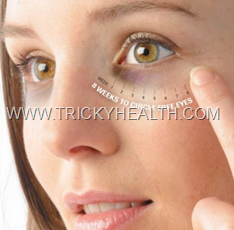Home Remedies to Remove Dark Circles
 Dark circles are the dark skin around the eyes. When the color of the skin around the eyes becomes dark than the color of the remaining face skin then this condition is called as dark circles. This is the more common problem in the both men & women.
Dark circles are the dark skin around the eyes. When the color of the skin around the eyes becomes dark than the color of the remaining face skin then this condition is called as dark circles. This is the more common problem in the both men & women.
This is not a serious condition & some of the home remedies can help to get rid of these dark circles. In medical terms, it is well known as the “periorbital dark circles”. The main cause of this condition is the skin changes that occur as the people get aged.
During the ageing process the collagen that maintains the skin turgidity is lost & because of that the skin losses its elasticity & the blood vessels under the skin surface become more visible & the skin becomes dark. Except this there are many reasons that cause the dark circles, these are as follows:
CAUSES OF THE DARK CIRCLES
1). HEREDITY: Heredity is the most common cause of the dark circles means this problem runs in the families as it is related to the skin texture.
The skin around the eyes is the thinnest because of this the blood vessels around the eyes are more visible & give the skin a dark bluish coloration called dark circles. As the skin texture is hereditary so the thin-skinned people are more prone to have dark circles.
2). ANEMIA: Anemia is the main cause of dark circles. Anemia is the medical term is a condition in which there is iron deficiency because of an improper diet. Because of anemia there is the insufficient blood supply to the tissues and the tissues will not get the oxygen supply which cause the skin to become dark means the dark circles.
3). MEDICATIONS: Some of the medications cause the allergies & puffiness because of this the blood supply to the area is impaired causing the dark circles. Some medications also cause blood vessel dilation which leads to dark circles.
4). ALLERGIES: Allergies to some of the particular season or the foods can lead to dark circles; because of the allergy there is itching in the eyes which give rise to dark circles. People diseased by HAY FEVER are commonly at risk to develop dark circles during the allergy season.
5). LIFESTYLE BEHAVIOUR: Some of the people who are habitual to smoking & drinking are at a greater risk to develop dark circles.
6). DURATION OF SUN EXPOSURE: People who are exposed to sunlight for a prolonged time without a break are prone to develop dark circles. Intense sun exposure leads to more melanin production in the skin which gives the skin a dark coloration & results in dark circles around the eyes.
7). HYPER PIGMENTION: In some people, there is more melanin production around the eyes as compared to other body parts which lead to dark circles. This condition in medical terms is known as “peri-orbital hyperpigmentation.”
HOME HEALTH CARE TIPS TO REMOVE EYES DARK CIRCLE
There are various natural health tips which you can try to get rid of dark circles. These natural health tips are available easily at your own home settings which are cost-effective for you. The most important thing about these natural home remedies is that you have to practice these regularly for a better result as these take time for their effectiveness. These natural home tips are as follows:
· LEMON JUICE: Application of lemon juice is also helpful in removing the Dark circles. Apply the lemon juice around your eyes with the help of cotton balls & let it dry for an hour then wipe it with a damp cloth. Do this home remedy for two to three times in a day & this will help in the removal of dark circles as the lemon has a natural bleaching property as well is a rich source of vitamin C.
· GREEN APPLE: Green apple is a rich source of potassium, vitamin B & C and is very helpful in removing the dark circles. Apply the paste of boiled green apple around the eyes & let it dry for an hour & then wash it with lukewarm water.
· RIPE APPLES: You can also use ripe apple thin slices directly on the eyes to get rid of dark circles as the ripe apples are a good source of tannin which helps in lightening your skin.
· ADEQUATE SLEEP: Inadequate sleeping pattern is a major cause of dark circles. A person should have a sleep time minimum of seven hours during night time. Adequate sleep time is required to give rest to the eyes. So for removing dark circles a person should have adequate and sound sleep.
· TURMERIC: Turmeric paste is very effective in removing the dark circles as turmeric has an anti-inflammatory, oxidant & healing property. You can use turmeric as making a thick paste of turmeric powder and pine apple juice. Apply this paste around your eyes, leave it for 10-15 minutes & then wipe it with a damp cloth. Repeat this remedy frequently for a better result.
· CUCUMBER: Cucumber is very helpful in removing the dark circles because of its cooling & soothing property. You can use cucumber in two ways; either you can apply cucumber juice around the eyes or you can apply thin cucumber slices directly on the eyes. Dip two clean cotton balls in cucumber juice & place them on each eye for 10 minutes. Frequently repeat this remedy for good results. You can also apply thin cucumber slices on the eyes to get rid of dark circles.
· MINT: Mint has a cooling property. You can apply the mint leaves juice around the eyes with the help of cotton balls or you can make a paste of turmeric & mint leaves juice. Leave this paste for 10 minutes & then wipe it with a damp cloth. Frequent use of this remedy can help in removing the dark circles to a greater extent.
· ROSE WATER: Rosewater has cooled, rejuvenating & skincare properties and is an easy & effective way to remove the dark circles. Apply the rose water on your close eyes with the help of clean cotton balls. This will help in reducing the dark circles within a few days.
· YOGA & MEDITATION: Stress is the main cause of dark circles. Yoga & meditation will help in reducing the stress by keeping the mind relax & peaceful. Practicing yoga and meditation on a regular base will help in reducing stress as well the dark circles.
· POTATO: Potato is having a natural bleaching property so helps in lightening the skin so potato application on the dark circles can help to get rid of dark circles. Apply the thin slices of raw potato on your close eyes & leave it for 10 minutes. This is the most effective and easy way to get rid of dark circles.
· ALMOND OIL: You can use almond oil around the eyes at bedtime, leave it overnight & wash in the morning. This will help in removing the dark circles if used regularly.
These all home remedies are very beneficial in getting rid of dark circles and are easily available at home. Just follow these home beauty tips & feel good as there is no matter to worry about the dark circles.
 What is Migraine: A very typically a headache with moderate to severe throbbing or pounding on one side of your head known as Migraine. Migraine may start as a dull headache and can spread from one side of your skull to the other side of the head.
What is Migraine: A very typically a headache with moderate to severe throbbing or pounding on one side of your head known as Migraine. Migraine may start as a dull headache and can spread from one side of your skull to the other side of the head. 





